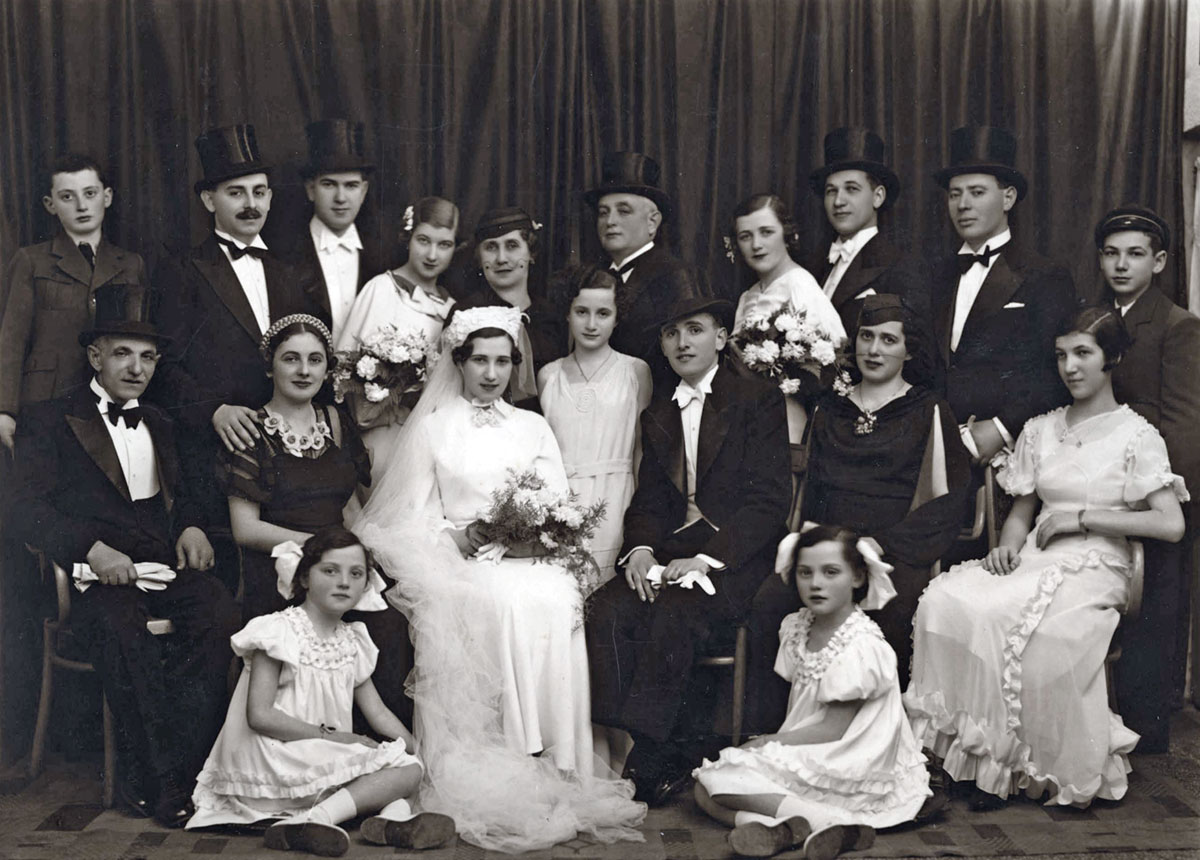Moritz-Moshe-Misu Reichman and Sylvia-Devorah Marco (Marcu) got married in Bucharest on 6 March 1936, surrounded by their respective families. Some five years later, Misu, Sylvia and many of their wedding guests drowned in the Black Sea in the Struma disaster.
Top row, from right: Menachem-Mendy Marco, Pinko Rosenzweig (perished), Martin Marco, Klara Reichman (perished), Menashe Reichman (murdered in the pogroms in Bucharest in January 1941), Anetta-Chana Reichman (perished), Suzeta Marco (perished), - -, - -, Harry Rosenzweig (perished).
Middle row, from right: Sorina Marco (perished), Betty Rosenzweig (perished), the groom, Misu Reichman (perished), Surika Diamant, the bride, Sylvia Marco-Reichman (perished), - -, Asher Marco.
Seated, bottom: twins Aurica and Ella-Lucia Rosenzweig (perished).
Yad Vashem Photo Archives 8712/1
Misu Reichmann was born in Târgu Ocna, Romania, one of Menashe and Anetta-Chana's ten children. Seven of the children survived infancy: Sophie, Betty, Leora-Leah, Klara, Misu (b. 1910), Bella and Chaim. The family moved to Bucharest in 1924. By 1935, Leora, Bella and Chaim, all active in Zionist organizations, had immigrated to Eretz Israel (Mandatory Palestine).
Sylvia Marco was born in Bucharest, Romania in 1913 to parents Asher and Roza, the second of five children (Martin, Sylvia, Suzeta, Sorina and Menache-Mendy).
Misu studied law, but wasn't able to complete his studies and was expelled from the university because of the numerus clausus regulations, also applicable in Romania. He served in the Romanian Army for two years, and married Sylvia Marco in 1936. He set up a successful independent business in the wood trade, and would travel all over Romania, renting forested areas, cutting down trees and bringing the logs to the sawmill. When restrictions were imposed on Jews in Romania in the late 1930s, Misu was forced to stop trading in wood, and instead opened a small perfumery shop with Sylvia in Bucharest. He would create perfumes from essences in the back room, and Sylvia would sell them in the store.
Misu's father, Menashe Reichman, was murdered in the pogrom against the Jews of Bucharest in January 1941. These brutal events motivated the Reichmans to search for an escape route, and they decided to immigrate to Eretz Israel and reunite with the family members already there. The Reichmans were amongst the first to buy tickets on the Struma. In December 1941, they went aboard: Misu and Sylvia, Misu's mother Chana, his sister Klara, his sister Betty Rosenzweig, her husband and their three children. His sister Sophie Diamant, her husband and their two daughters were supposed to go too, but changed their minds in light of the rumors about the ship's unseaworthiness. Sylvia's two single sisters, Suzeta and Sorina were also passengers. They sent their dowries ahead to Eretz Israel before the journey.
On 24 February 1942, the Struma was torpedoed by a Soviet submarine. All the passengers except for one, and the entire crew drowned in the Black sea, including Misu, Sylvia and all the relatives who were with them on board. "The news of the Struma's sinking was already known the next day," relates Menachem Marco, Sylvia's brother. "There was a tiny article in the newspaper. Both my parents read the newspaper every day. That's how we found out. Mother hid the news from Father, and Father from Mother… And I hid it from both of them. In the end it was made public… We had lost my three sisters."
In 1946, Menachem Marco, brother of Sylvia, Suzeta and Sorina, immigrated to Eretz Israel. His parents followed in 1949. Menachem succeeded in retrieving the property his sisters had sent to Israel. Items from Suzeta and Sorina's dowries were later donated to Yad Vashem, and they now form part of the permanent exhibition at the Holocaust History Museum, mute testimony to the Struma disaster.
In 1955, Menachem-Mendy Marco submitted Pages of Testimony to Yad Vashem in memory of his sisters, Sylvia, Sorina and Suzeta. A year later, Misu's sister Bella Florenthal submitted Pages of Testimony in memory of her mother, her brother, her sister Klara, her sister Betty Rosenzweig, her husband and their children, all of whom perished when the Struma was sunk.









